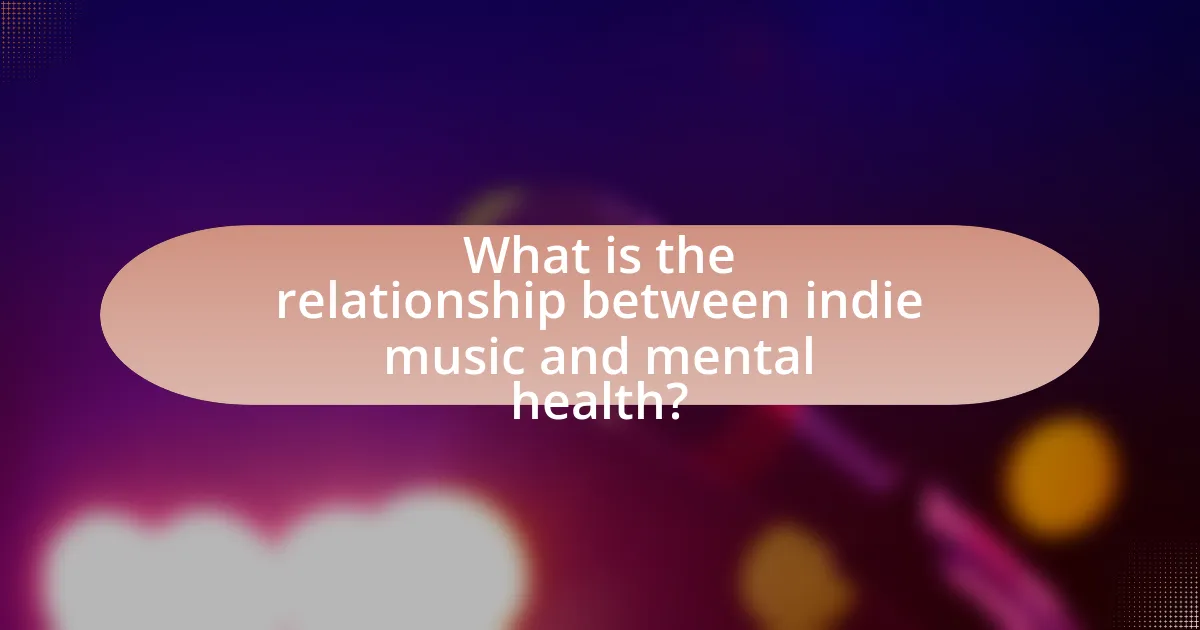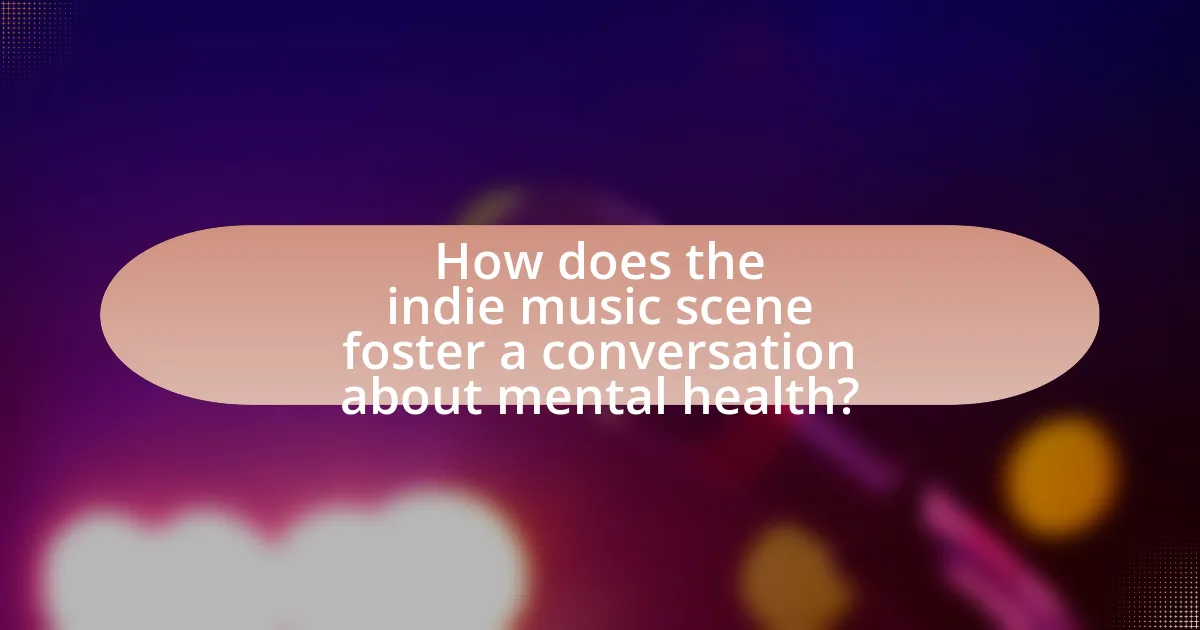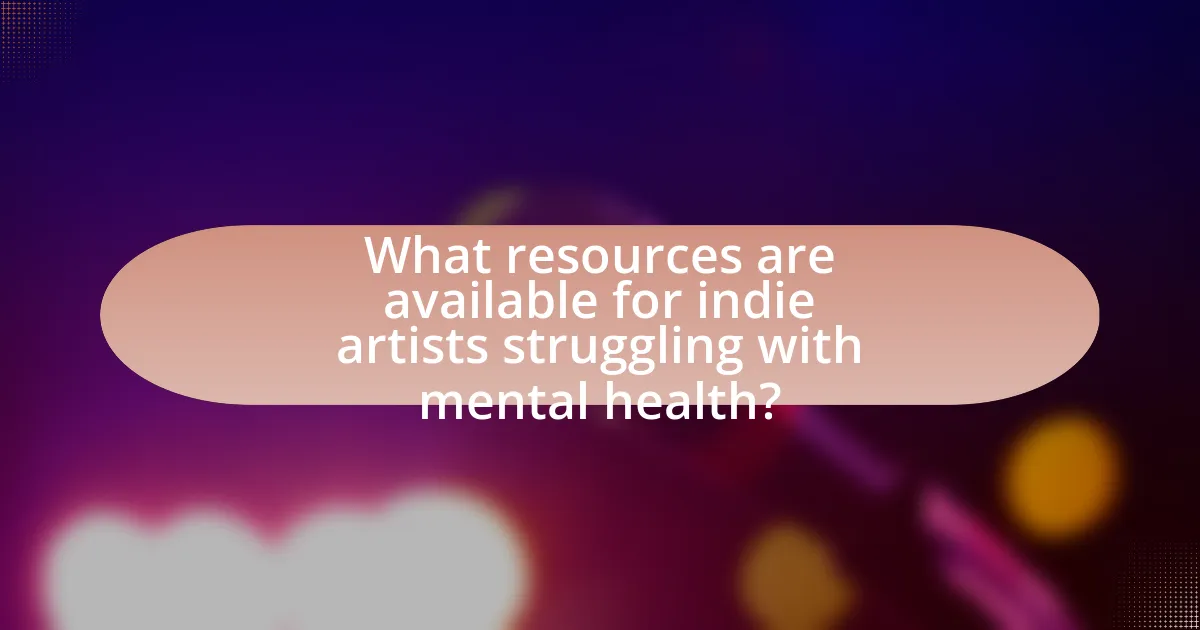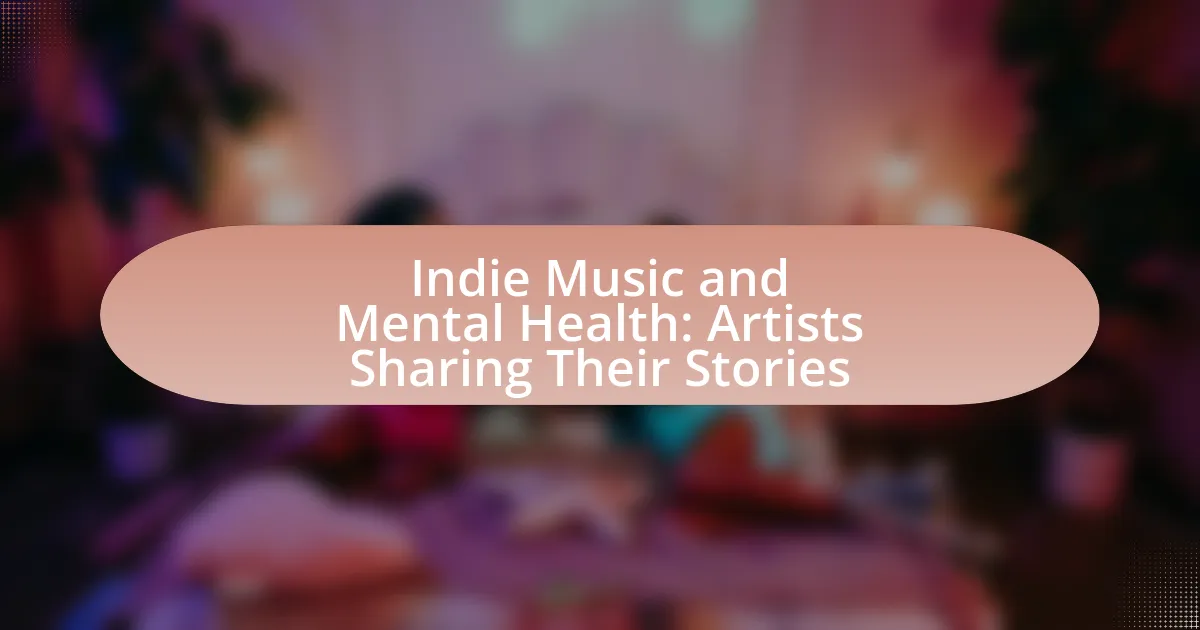The article focuses on the relationship between indie music and mental health, highlighting how artists use their music as a therapeutic outlet to express personal struggles with mental health issues. It discusses common themes in indie music, such as anxiety and depression, and emphasizes the importance of authenticity in fostering connections between artists and listeners. The article also explores how the indie music community supports mental health initiatives, shares personal stories, and promotes awareness through events and collaborations. Additionally, it outlines available resources for artists and practical steps they can take to prioritize their mental well-being.

What is the relationship between indie music and mental health?
Indie music often serves as a therapeutic outlet for both artists and listeners, fostering emotional expression and connection. Many indie musicians openly discuss their struggles with mental health in their lyrics, creating a sense of community and understanding among fans. Research indicates that engaging with music, particularly genres like indie, can alleviate symptoms of anxiety and depression, as it allows individuals to process their emotions and experiences. For instance, a study published in the Journal of Positive Psychology found that music can enhance mood and promote emotional well-being, highlighting the positive impact of indie music on mental health.
How do indie artists express their mental health struggles through music?
Indie artists express their mental health struggles through music by creating lyrics that reflect their personal experiences and emotions related to mental health issues. These artists often use raw and honest storytelling to convey feelings of anxiety, depression, and isolation, allowing listeners to connect with their struggles on a deeper level. For instance, artists like Phoebe Bridgers and Sufjan Stevens have openly discussed their mental health in interviews and through their songs, providing a sense of authenticity and vulnerability. This approach not only fosters a sense of community among listeners who may share similar experiences but also raises awareness about mental health topics, contributing to broader conversations around these issues in society.
What themes related to mental health are commonly found in indie music?
Common themes related to mental health found in indie music include anxiety, depression, self-identity, and emotional vulnerability. Artists often explore these themes through personal narratives and introspective lyrics, reflecting their own struggles and experiences. For instance, songs frequently address feelings of isolation and the search for belonging, which resonate with listeners facing similar challenges. Research indicates that music can serve as a therapeutic outlet, with indie artists using their platforms to raise awareness about mental health issues, thereby fostering a sense of community and understanding among fans.
How do lyrics reflect the personal experiences of artists?
Lyrics reflect the personal experiences of artists by serving as a medium through which they express their emotions, struggles, and life events. For instance, many indie musicians draw from their own mental health challenges, relationships, and societal observations, translating these experiences into relatable narratives. A notable example is the song “Breathe Me” by Sia, which addresses themes of vulnerability and emotional pain, stemming from her own battles with mental health. This connection between personal experience and lyrical content allows listeners to resonate with the artist’s journey, fostering a sense of community and understanding.
Why is indie music a significant platform for discussing mental health?
Indie music is a significant platform for discussing mental health because it often features deeply personal lyrics that resonate with listeners’ experiences. Artists in the indie genre frequently explore themes of anxiety, depression, and emotional struggles, creating a relatable narrative that fosters connection and understanding. For instance, studies have shown that music can serve as a therapeutic tool, with a 2013 study published in the Journal of Music Therapy indicating that songwriting can help individuals process their emotions and improve mental well-being. This openness in indie music encourages dialogue about mental health issues, reducing stigma and promoting awareness.
What role does authenticity play in indie music’s impact on mental health awareness?
Authenticity in indie music significantly enhances its impact on mental health awareness by fostering genuine connections between artists and listeners. Indie musicians often share personal experiences and struggles, which resonate deeply with audiences, creating a sense of community and understanding. For instance, studies have shown that music with authentic emotional expression can lead to increased empathy and openness about mental health issues, as seen in the works of artists like Sufjan Stevens and Phoebe Bridgers, who openly discuss their mental health challenges in their lyrics. This candidness not only validates listeners’ feelings but also encourages conversations around mental health, reducing stigma and promoting healing.
How does the indie music community support mental health initiatives?
The indie music community supports mental health initiatives through fundraising events, awareness campaigns, and the promotion of open discussions about mental health. Many indie artists organize benefit concerts where proceeds are donated to mental health organizations, such as the National Alliance on Mental Illness, which reported that music events can raise significant funds for mental health services. Additionally, artists often use their platforms to share personal stories about mental health struggles, fostering a culture of openness and reducing stigma. For example, the initiative “To Write Love on Her Arms” has collaborated with various indie musicians to raise awareness and provide resources for those in need. This combination of fundraising, advocacy, and personal storytelling effectively promotes mental health awareness within the community.
What are some notable examples of indie artists sharing their mental health stories?
Notable examples of indie artists sharing their mental health stories include artists like Sufjan Stevens, who openly discusses his struggles with anxiety and depression in his music, particularly in the album “Carrie & Lowell.” Another example is Phoebe Bridgers, who addresses themes of mental illness and trauma in her lyrics, notably in songs like “Motion Sickness.” Additionally, the band Death Cab for Cutie, led by Ben Gibbard, has explored mental health issues in songs such as “I Will Follow You into the Dark,” which reflects on loss and grief. These artists have contributed to the conversation around mental health through their personal narratives and music, helping to destigmatize these experiences.
How have specific artists used their platforms to raise awareness?
Specific artists have used their platforms to raise awareness about mental health issues by sharing personal stories and creating music that addresses these challenges. For instance, artists like Sufjan Stevens and Phoebe Bridgers have openly discussed their struggles with anxiety and depression in interviews and through their lyrics, fostering a dialogue around mental health. Additionally, they often engage with their audiences on social media, promoting mental health resources and encouraging fans to seek help. This approach not only normalizes conversations about mental health but also provides listeners with relatable experiences, thereby reducing stigma and encouraging support within the community.
What impact have these stories had on fans and listeners?
The stories shared by indie music artists have significantly impacted fans and listeners by fostering a sense of connection and understanding regarding mental health issues. These narratives often resonate deeply with audiences, providing validation for their own experiences and emotions. For instance, a study published in the Journal of Music Therapy found that music can serve as a therapeutic tool, helping individuals process their feelings and reduce symptoms of anxiety and depression. This connection is further evidenced by the rise in online communities where fans discuss their struggles, inspired by the openness of artists. Such engagement not only promotes mental health awareness but also encourages listeners to seek help and support, demonstrating the powerful role of storytelling in music.

How does the indie music scene foster a conversation about mental health?
The indie music scene fosters a conversation about mental health by providing a platform for artists to share personal experiences and struggles through their lyrics and public discussions. This genre often emphasizes authenticity and vulnerability, encouraging both artists and listeners to engage in open dialogues about mental health issues. For instance, many indie musicians openly discuss their battles with anxiety, depression, and other mental health challenges in interviews and social media, which helps to destigmatize these topics. Research indicates that music can be a powerful tool for emotional expression and connection, with studies showing that listening to or creating music can significantly improve mental well-being. By addressing mental health openly, the indie music scene not only raises awareness but also fosters a supportive community where individuals feel less isolated in their experiences.
What events or movements within the indie music community focus on mental health?
Events and movements within the indie music community that focus on mental health include initiatives like “Mental Health Awareness Month” events, “The Music Industry Mental Health Summit,” and “Stronger Than Silence.” These events aim to raise awareness, provide resources, and foster discussions about mental health challenges faced by artists and fans alike. For instance, “Stronger Than Silence” is a campaign that encourages musicians to share their mental health struggles, promoting a culture of openness and support within the community. Additionally, many indie festivals incorporate mental health resources and workshops, emphasizing the importance of mental well-being in the music industry.
How do festivals and concerts promote mental health awareness?
Festivals and concerts promote mental health awareness by providing a platform for artists to share personal stories and experiences related to mental health challenges. These events often feature discussions, workshops, and performances that highlight the importance of mental well-being, encouraging open dialogue among attendees. For instance, studies have shown that music can significantly reduce anxiety and depression, with live performances fostering a sense of community and belonging, which are crucial for mental health. Additionally, organizations often partner with festivals to distribute resources and information about mental health services, further amplifying awareness and support for those in need.
What initiatives have been launched by indie labels to support artists’ mental health?
Indie labels have launched several initiatives to support artists’ mental health, including mental health awareness campaigns, access to counseling services, and wellness workshops. For instance, labels like Beggars Group have implemented mental health training for staff and artists, while others provide resources for therapy and support networks. These initiatives aim to create a supportive environment that prioritizes the well-being of artists, recognizing the unique pressures they face in the music industry.
How do collaborations among artists enhance discussions on mental health?
Collaborations among artists enhance discussions on mental health by creating a platform for shared experiences and diverse perspectives. When artists work together, they combine their unique narratives and emotional insights, which can resonate with a broader audience. This collective storytelling fosters a sense of community and normalizes conversations around mental health issues. For instance, studies show that collaborative projects in music, such as those seen in the indie genre, often address personal struggles, thereby encouraging listeners to engage with their own mental health challenges. This approach not only raises awareness but also reduces stigma, as artists openly discuss their vulnerabilities, making mental health a more approachable topic for fans and the public.
What are some examples of collaborative projects that address mental health themes?
Some examples of collaborative projects that address mental health themes include the “Hope for the Day” initiative, which combines music and mental health awareness through events and artist partnerships, and the “Music for Mental Health” campaign, where various indie artists contribute tracks to raise funds for mental health organizations. These projects effectively utilize the influence of music to foster discussions around mental health, as evidenced by the increased engagement and donations reported during their campaigns.
How do these collaborations influence public perception of mental health?
Collaborations between indie musicians and mental health organizations significantly enhance public perception of mental health by normalizing discussions around mental health issues. These partnerships often lead to increased visibility and awareness, as artists share their personal experiences with mental health challenges through their music and public platforms. For instance, campaigns like “Mental Health Awareness Month” have seen artists like Halsey and Logic openly discuss their struggles, which helps to reduce stigma and encourages fans to seek help. Research indicates that when celebrities openly discuss mental health, it can lead to a 20% increase in help-seeking behavior among their followers, demonstrating the powerful impact of these collaborations on societal attitudes towards mental health.

What resources are available for indie artists struggling with mental health?
Indie artists struggling with mental health can access various resources, including mental health hotlines, therapy services, and support groups tailored for creatives. Organizations like MusiCares provide financial assistance and mental health support specifically for musicians, while the National Alliance on Mental Illness (NAMI) offers resources and education on mental health issues. Additionally, online platforms such as BetterHelp and Talkspace provide accessible therapy options. Research indicates that musicians face higher rates of mental health challenges, emphasizing the importance of these resources for their well-being.
What types of support systems exist within the indie music community?
The indie music community has several support systems, including peer networks, online platforms, mental health resources, and collaborative projects. Peer networks consist of fellow musicians and artists who provide emotional and professional support, often sharing experiences and advice. Online platforms, such as social media groups and forums, facilitate discussions about mental health and offer a space for artists to connect and share their struggles. Mental health resources, including organizations like MusiCares, provide access to counseling and financial assistance for artists facing mental health challenges. Collaborative projects, such as benefit concerts and community events, foster a sense of belonging and collective support among indie musicians. These systems collectively contribute to the well-being of artists within the indie music scene.
How can artists access mental health resources and counseling?
Artists can access mental health resources and counseling through various platforms and organizations dedicated to supporting creative professionals. Many organizations, such as the Music Industry Mental Health Coalition and Help Musicians UK, offer specific programs and resources tailored for artists, including counseling services, workshops, and online support. Additionally, artists can seek help from licensed therapists who specialize in working with creatives, often found through directories like Psychology Today or TherapyDen. These resources are crucial as studies indicate that artists face higher rates of mental health issues, emphasizing the importance of accessible support systems.
What role do peer support networks play in artist well-being?
Peer support networks significantly enhance artist well-being by providing emotional support, reducing feelings of isolation, and fostering a sense of community. These networks allow artists to share experiences, challenges, and coping strategies, which can lead to improved mental health outcomes. Research indicates that social support is linked to lower levels of anxiety and depression among creative individuals, highlighting the importance of these networks in promoting resilience and emotional stability. For instance, a study published in the Journal of Music Therapy found that musicians who engaged in peer support reported higher levels of life satisfaction and lower stress levels, demonstrating the tangible benefits of such connections for artists’ mental health.
What practical steps can indie artists take to prioritize their mental health?
Indie artists can prioritize their mental health by establishing a structured routine that includes regular breaks, physical activity, and mindfulness practices. Research indicates that routines can enhance mental well-being by providing stability and predictability, which is crucial in the often unpredictable music industry. Additionally, engaging in physical activities, such as exercise, has been shown to reduce symptoms of anxiety and depression, as supported by a study published in the Journal of Clinical Psychiatry, which found that regular physical activity can significantly improve mood and overall mental health. Mindfulness practices, such as meditation or yoga, have also been proven to decrease stress levels and improve emotional regulation, as evidenced by research from the American Psychological Association, which highlights the benefits of mindfulness in enhancing mental resilience. By incorporating these practical steps, indie artists can create a supportive environment for their mental health.
How can artists create a balanced work-life dynamic in the music industry?
Artists can create a balanced work-life dynamic in the music industry by setting clear boundaries between their professional and personal lives. Establishing specific work hours and adhering to them helps prevent burnout, as evidenced by studies showing that structured schedules improve mental health and productivity. Additionally, prioritizing self-care activities, such as exercise and social interactions, contributes to overall well-being, which is crucial in a high-pressure environment like the music industry. Research indicates that artists who engage in regular self-care practices report lower levels of stress and higher job satisfaction. By implementing these strategies, artists can maintain a healthier balance, ultimately enhancing their creativity and longevity in their careers.
What self-care practices are recommended for indie musicians?
Self-care practices recommended for indie musicians include regular physical exercise, mindfulness meditation, and establishing a balanced work-life routine. Engaging in physical activity has been shown to reduce stress and improve mental health, which is crucial for musicians facing the pressures of the industry. Mindfulness meditation can enhance focus and emotional regulation, helping artists manage anxiety and creative blocks. Additionally, maintaining a structured schedule that allows for breaks and personal time can prevent burnout, a common issue in the demanding world of indie music. These practices are supported by research indicating that physical health and mental well-being are interconnected, particularly in high-stress professions like music.


